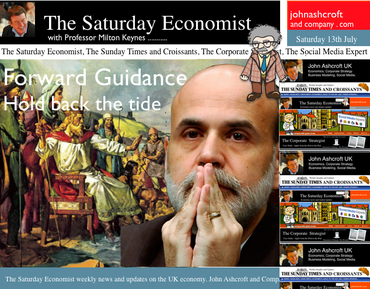 This week Ben Bernanke appeared to reel back the hardline stance on US monetary policy suggesting a “highly accommodative monetary policy” would probably be needed for the “foreseeable future”. Markets rallied and treasury yields fell on the statement mid week. So now we know, forward guidance and “constrained discretion” is linked to Treasury Yields and the Dow Jones index rather than payroll and inflation data. US markets love a dove and Bernanke, wings clipped by Obama remains the Wall Street favourite for now. Yields fell and the Dow closed back towards the 15,500 level. Despite the fears of tighter monetary conditions and the impact on recovery, QE will still be for the policy chop and US base rates may still rise towards the end of 2014. Fundamentals should push the markets higher with or without policy manipulation at the Fed. Speculation on Bernanke’s successor begin, Janet Yellon and Larry Summers both with PhDs, are two on the short list. Back in the UK A further blow for those who still believe in the rebalancing agenda or in the march of the makers rebuilding the workshop of the world. Are there any left in the MySpace group? Manufacturing output fell in May according to the ONS stats, down by 2.9% on the same month last year. Should we be too concerned about this gross set back? Probably not, last weeks PMI Markit survey data was much more upbeat on the manufacturing sector. For the year as a whole, we expect output to be down but not that much! The ONS warns “in 2012, the end of May bank holiday was moved to June resulting in an additional working day in May, which may have been a contributing factor to the growth (or lack of it) between these two periods!” Excellent, so much for - lies, damned lies and seasonal adjustments. The Balance of Payments data for the month, were much more straightforward. The trade figures for May reported a deficit, trade in goods of £8.5 billion, partly offset by an estimated surplus of £6.1 billion on services. The overall deficit trade in goods and services, was £2.4 billion compared to £2.0 billion in April. For the second quarter, the deficit trade in goods is likely to be around £26.5 billion and £106 billion for the year as a whole. Should we be worried about this? Not really. The figures are in line with our forecasts at start of year. "We should see things as they are, not as we would like them to be", Jack Welch said that. As for sterling, a weaker currency does not lead to an improvement in net trade performance but it does have an impact on domestic inflation. Carney take note. Lessons from history - “Great is the power of steady misinterpretation” Charles Darwin said that in "Origin of the Specious" probably. What happened to sterling? Sterling recovered this week closing at $1.51 from 1.4897 but slipped against the euro to 1.1560 from 1.1611. The Euro dollar closed unchanged at 1.31 and against the Yen, the dollar closed at 99.01 from 101.2. What is it about the Euro? Oil Price Brent Crude closed up $108.8 from $107.72. The average price in July 2012 was $103 approximately. Markets, The Dow closed up 15,464 from 15,135. The FTSE closed at 6,545 from 6,376. Markets have rallied from lows, this is the time to average in. UK Ten year gilt yields closed at 2.33 from 2.51, US Treasury yields closed at 2.59 from 2.74. The feral hogs sated for now. Yields are set to move higher, the financially repressed will break free one day. Gold closed down at $1, 277 from $1,232. Shorts covered but worshippers of the old relic still at a loss, as we begin the exodus from Planet ZIRP. That’s all for this week, don’t miss The Sunday Times and Croissants out tomorrow. Join the mailing list for The Saturday Economist or forward to a friend UK Economics news and analysis : no politics, no dogma, no polemics, just facts. John The material is based upon information which we consider to be reliable but we do not represent that it is accurate or complete and it should not be relied upon as such. We accept no liability for errors, or omissions of opinion or fact. In particular, no reliance should be placed on the comments on trends in financial markets. The receipt of this email should not be construed as the giving of investment advice.
0 Comments
Leave a Reply. |
The Saturday EconomistAuthorJohn Ashcroft publishes the Saturday Economist. Join the mailing list for updates on the UK and World Economy. Archives
July 2024
Categories
All
|
| The Saturday Economist |
The material is based upon information which we consider to be reliable but we do not represent that it is accurate or complete and it should not be relied upon as such. We accept no liability for errors, or omissions of opinion or fact. In particular, no reliance should be placed on the comments on trends in financial markets. The presentation should not be construed as the giving of investment advice.
|
The Saturday Economist, weekly updates on the UK economy.
Sign Up Now! Stay Up To Date! | Privacy Policy | Terms and Conditions | |
 RSS Feed
RSS Feed